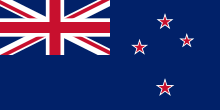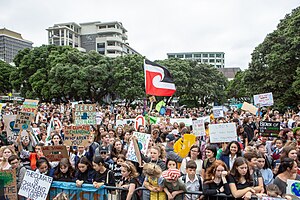 | |
 A group of young New Zealanders at a climate change protest in Wellington, 2019 | |
| Total population | |
|---|---|
c. 5.8 million
 | |
| Regions with significant populations | |
| c. 5,340,000 | |
| 640,770[1] | |
| 58,286[2] | |
| 22,872[2] | |
| 17,485[3] | |
| 4,260[2] | |
| 4,000[4] | |
| 3,146[2] | |
| 3,000[5] | |
| 2,631[6][7] | |
| 2,195[2] | |
| 1,400[8] | |
| 1,256[9] | |
| 4,000 | |
| Languages | |
| English · Te Reo Māori · Other minority languages | |
| Religion | |
| Plurality: Irreligious Minority: Christianity (Anglican, Protestantism, Roman Catholicism) and other minority religions[10] | |
| Related ethnic groups | |
| Australians, Britons | |
New Zealanders (Māori: Tāngata Aotearoa) are people associated with New Zealand, sharing a common history, culture, and language (New Zealand English). People of various ethnicities and national origins are citizens of New Zealand, governed by its nationality law.
Originally composed solely of the indigenous Māori, the ethnic makeup of the population has been dominated since the 19th century by New Zealanders of European descent, mainly of English, Scottish, Welsh and Irish ancestry, with smaller percentages of other European and Middle Eastern ancestries such as Greek, Turkish, Italian and other groups such as Arab, German, Dutch, Scandinavian, South Slavic and Jewish, with Western European groups predominating. Today, the ethnic makeup of the New Zealand population is undergoing a process of change, with new waves of immigration, higher birth rates and increasing interracial marriage resulting in the New Zealand population of Māori, Asian, Pasifika and multiracial descent growing at a higher rate than those of solely European descent, with such groups projected to make up a larger proportion of the population in the future.[11] New Zealand has an estimated resident population of around 5,338,500 (as of June 2024).[12] Over one million New Zealanders recorded in the 2013 New Zealand census were born overseas, and by 2021 over a quarter of New Zealanders are estimated to be foreign born.[13] Rapidly increasing ethnic groups vary from being well-established, such as Indians and Chinese, to nascent ones such as African New Zealanders.[14]
While most New Zealanders are resident in New Zealand, there is also a significant diaspora, estimated at around 750,000. Of these, about 640,800 lived in Australia (a June 2013 estimate[update]),[1] which was equivalent to 12% of the resident population of New Zealand. Other communities of New Zealanders abroad are heavily concentrated in other English-speaking countries, specifically the United Kingdom, the United States and Canada, with smaller numbers located elsewhere.[2] New Zealanders have had a cultural influence on a global scale, through film, language, te ao Māori, art, science, music and technology, and founded the modern women's suffrage and anti-nuclear movements. Technological and scientific achievements of New Zealanders stem back as far as Kupe and the earliest Polynesian navigators, who used sophisticated astral methods that helped laid the groundwork for both navigation and modern astronomy.[15] Modern trench warfare is often argued to have originated in New Zealand among Māori in the 19th century.[16] New Zealanders also pioneered nuclear physics (Ernest Rutherford),[17] the women's suffrage movement (Kate Sheppard), modern Western conceptions of gender identity (John Money) and plastic surgery (Harold Gillies).[18]
New Zealand culture is essentially a Western culture influenced by the unique environment and geographic isolation of the islands, and the cultural input of the Māori and the various waves of multiethnic migration which followed the British colonisation of New Zealand. A colloquial name for New Zealanders is a Kiwi (/kiːwiː/).[19][20][21]
- ^ a b Australian Department of Immigration and Border Protection (2 January 2014). "Fact Sheet 17 – New Zealanders in Australia". Archived from the original on 12 February 2014. Retrieved 14 February 2014.
- ^ a b c d e f John Bryant and David Law (September 2004). "New Zealand's Diaspora and Overseas-born Population: The diaspora". New Zealand Treasury. Archived from the original on 6 February 2018. Retrieved 10 August 2010.
- ^ "Immigrant status and period of immigration by place of birth and citizenship: Canada, provinces and territories and census metropolitan areas with parts". Statistics Canada. Statistics Canada Statistique Canada. 7 May 2021. Retrieved 3 January 2023.
- ^ Matthew Chung (6 November 2009). "From F1 to Fifa, the show rolls on". The National. Archived from the original on 22 February 2014. Retrieved 11 August 2010.
- ^ "Living in Hong Kong". New Zealand Ministry of Foreign Affairs and Trade. Retrieved 28 June 2017.
- ^ "Anzahl der Ausländer in Deutschland nach Herkunftsland (Stand: 31. Dezember 2014)".
- ^ "Pressemitteilungen – Ausländische Bevölkerung – Statistisches Bundesamt (Destatis)" (in German). Destatis.de. 29 March 2016. Retrieved 28 June 2017.
- ^ Erwin Dopf. "Présentation de la Nouvelle-Zélande, Relations bilatérales". diplomatie.gouv.fr. Retrieved 8 April 2015.
- ^ "Imigrantes internacionais registrados no Brasil". www.nepo.unicamp.br. Retrieved 20 August 2021.
- ^ "2018 Census totals by topic" (Microsoft Excel spreadsheet). Statistics New Zealand. Retrieved 20 August 2022.
- ^ Gillian Smeith and Kim Dunstan (June 2004). "Ethnic Population Projections: Issues and Trends". Statistics New Zealand. Retrieved 10 August 2010.
- ^ "Aotearoa Data Explorer". Statistics New Zealand. Retrieved 26 October 2024.
- ^ "Number of overseas-born tops 1 million, 2013 Census shows". Statistics New Zealand. 15 April 2014. Archived from the original on 30 July 2017. Retrieved 30 July 2017.
- ^ Walrond, Carl (2015). "Africans". Te Ara: The Encyclopedia of New Zealand. Retrieved 3 April 2021.
- ^ Vermillion, Stephanie. "Polynesia's master voyagers who navigate by nature". www.bbc.com. Retrieved 30 May 2022.
- ^ "Ruapekapeka". nzhistory.govt.nz. Retrieved 8 August 2023.
- ^ "Ernest Rutherford | Accomplishments, Atomic Theory, & Facts | Britannica". www.britannica.com. Retrieved 30 May 2022.
- ^ "Walter Ernest O'Neil Yeo – One of the first people to undergo Plastic Surgery". The Yeo Society. 28 August 2008.
- ^ "Definition of 'kiwi'". Collins English Dictionary. Retrieved 28 July 2019.
- ^ Gary Morley (24 June 2010). "Kiwis hope to take flight at World Cup". CNN. Retrieved 11 August 2010.
- ^ "Kiwi and people: early history". Te Ara: The Encyclopedia of New Zealand. Retrieved 11 August 2010.